
Wanderstop is one of those video games where my delight only grew as I played more and more. With an overabundance of games lumped into the ‘cozy’ genre, I join other fans in being skeptical of whatever farming or management sim is thrown out next. More often than not, the game is redundant and without much to engage me past the 20-hour mark. However, once I saw the premise and developers behind Wanderstop, my attitude considerably shifted. What I didn’t expect was for the creator of The Stanley Parable to appear as the mind behind a tea-drinking simulator.
The Stanley Parable is a fairly notorious game, known for its subversion of how a video game is played and experimenting with the power and nuance of player choice—a highly valued asset—in its medium. The game is witty and thoughtful and seemed to be a one-off masterpiece that creators and fans experimented with and talked about for a long time. However, more than ten years later and another couple games under his belt, Davey Wreden has reappeared to present his take on the cozy game genre, and it reaches the highs that its predecessor laid down.
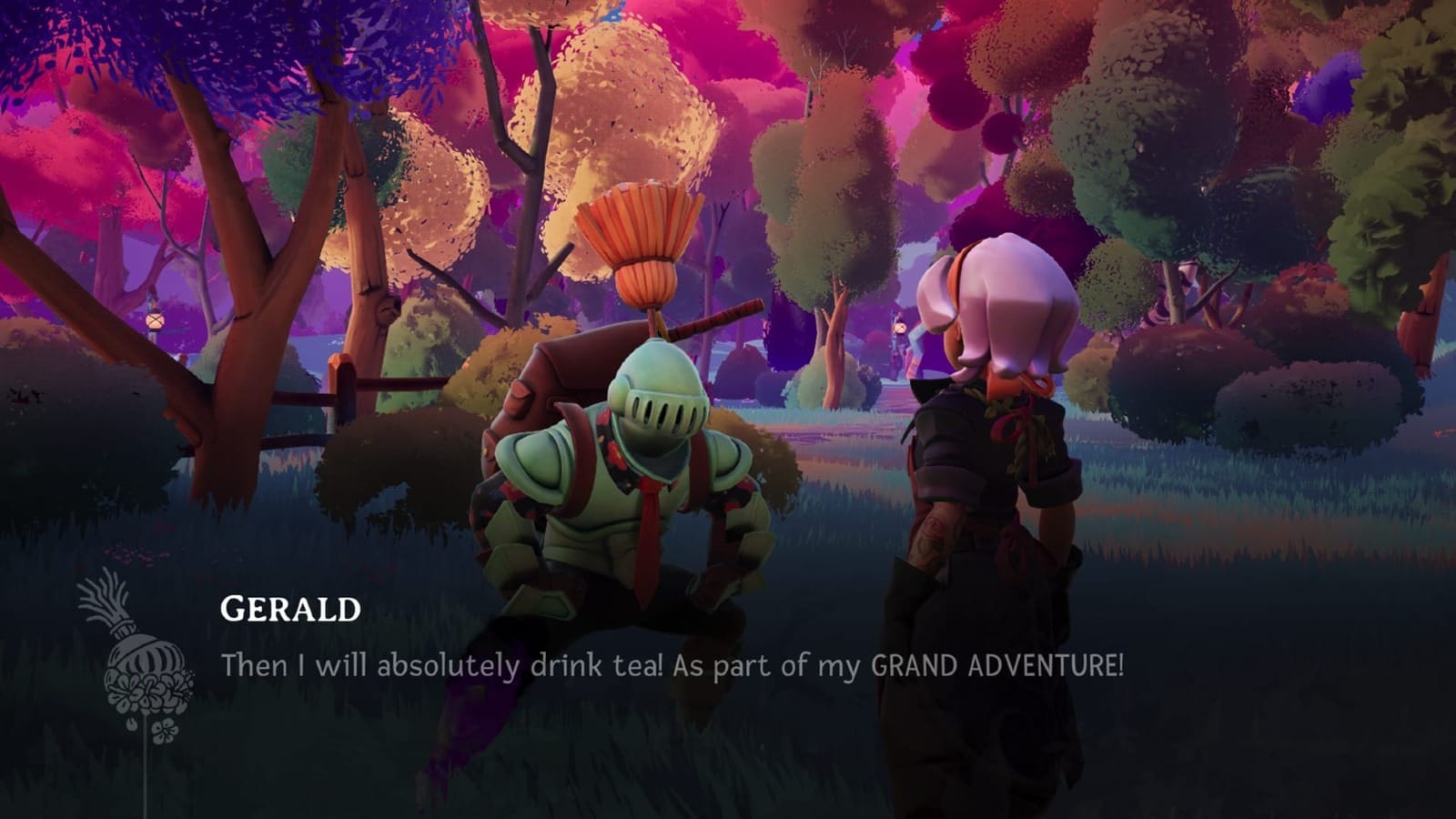
In this narrative-centric tea shop management game, you play as Alta, a fighter whose life ambition is to remain undefeated in battle. Having trained for most of her life, rigorously and without fault, she descends into a mental spiral when she loses two consecutive battles. In response to this, she embarks on a journey to find Master Winters, a retired master of swords and battle that she believes is the only one that can help her. However, when venturing through the forest, Alta finds she is exhausted and can barely lift her sword. Eventually fainting, she wakes up and sits on a bench next to a merry fellow named Boro. He explains the enchanted nature of the forest and that it led her here for an unknown reason. Unable to leave the forest without collapsing, Boro presents the idea that she stays and helps with his tea shop, Wanderstop. Where she can make tea, serve customers, and maintain the shop and surrounding area. Thus beginning Alta’s greatest battle yet.
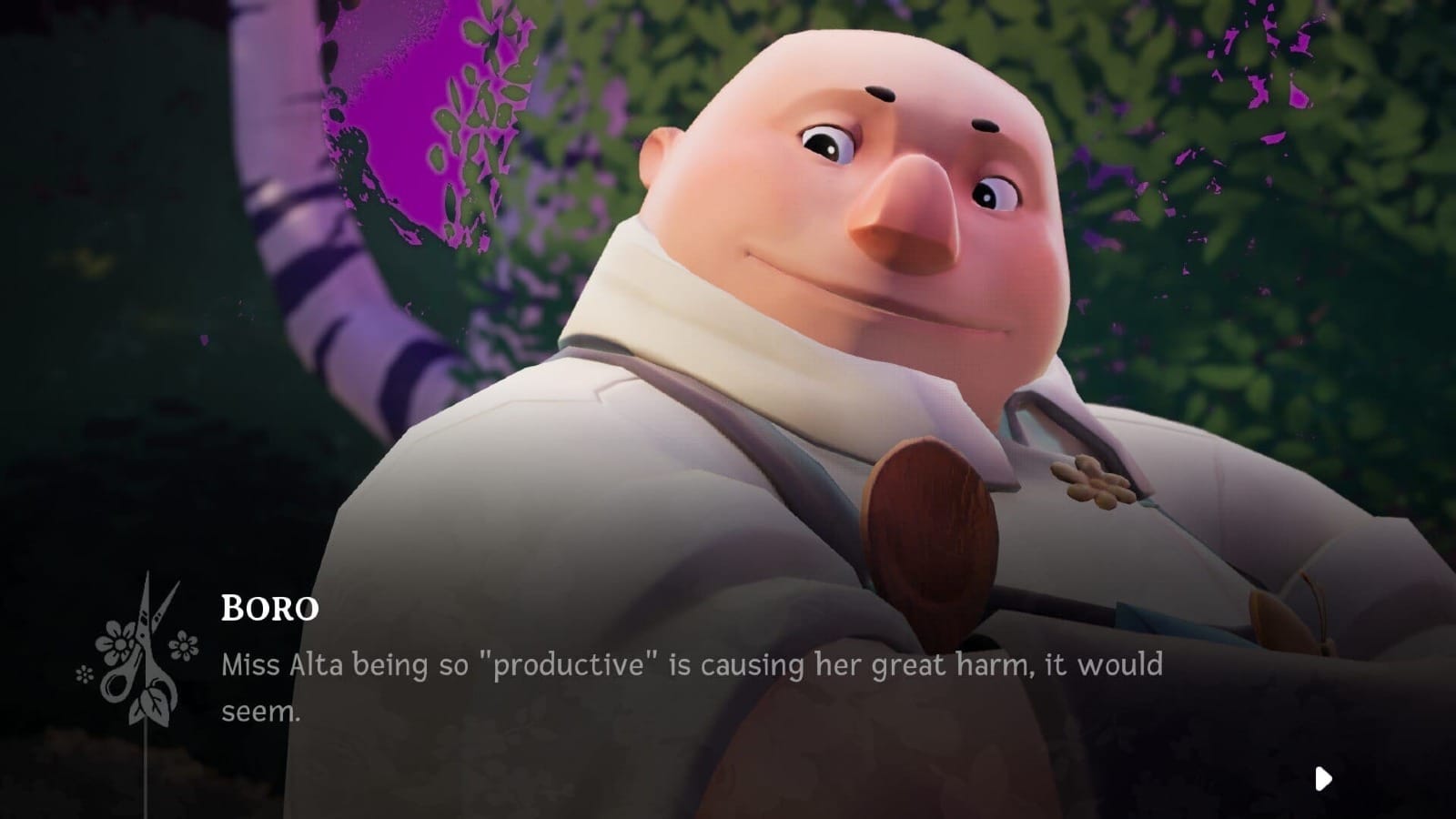
The core duties of Wanderstop are plentiful, and I never found myself getting bored, despite the idea that you are supposed to wind down. The gameplay is relaxing, and the tea making is actually a lot of fun. At the start of the game, Boro gives you a gardening guidebook that details all the seeds and plants you can use to flavor your tea. The plots you can plant in are a tiled system where you align 3 seeds in a row to create a ‘hybrid,’ which yields more seeds. Once you have enough, it takes 4 seeds to create a large ‘hybrid’ that provides fruit. Once the patterns are created, the middle plant will turn into a plant egg, which needs to be watered to grow into the hybrid and subsequent watering to bear multiple fruit and seeds. With 4 different types of seeds to use, you can mix and match patterns to create different hybrids with fruits that provide different flavors and experiences.
The types of fruit you can produce are quirky and humorous, their nature being more whimsical than rooted in reality. You have the Weyling fruit that -
‘It tastes like ginger and well-worn leather. Consumption tends to make one overly confident in their ability to do math’.
Or the Snok Cone that -
‘are noted for relieving physical pain when eaten. Tastes like citrus, milk, and whatever you most frequently ate for breakfast as a child’.
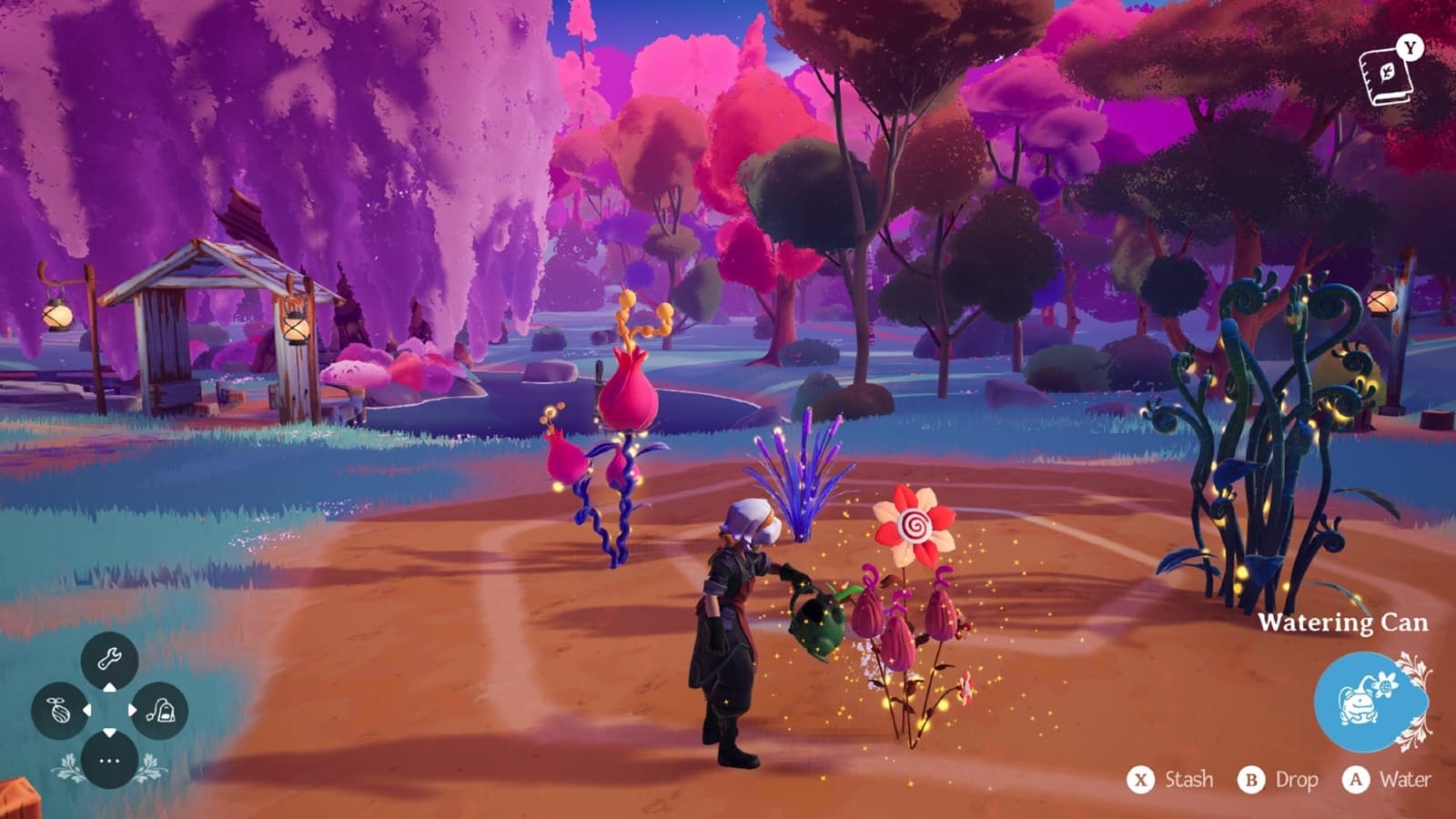
These funky descriptions are sneakily the best method of finding out more about your customers and even yourself. Alta can try any tea she creates, and each cup with a specific fruit provides details that relate to herself. The fruit that reminds you of your best friends highlights how Alta grew up friendless, and the fruit that makes you confess your mistakes harkens back to when Alta takes on an apprentice. Wanderstop is so layered in its character writing and turns mundane tasks into aspects that are meaningful to our main character.
With all this talk of tea, how do you actually put it all together? Smack-bang in the middle of Wanderstop is a glass contraption with levers, ropes, and ladders to interact with, looking like something straight out of Harry Potter. There are several points to interact with: you pull the rope to dump water into the flask, you heat it up by blowing hot air into the fire, and you stream it through to the next glass flask by opening a hatch. In this flask you can dump your tea ball and the ingredients, which produce an array of colors. Finally, you place one of your mugs on the tray and pull the rope to pour the tea in. All these functions are tiered and are reachable through a rolling ladder that rotates around the contraption. It's very smooth and satisfying to see everything form together. If you end up with more tea than necessary, you can even filter it back into the contraption, which then sprouts bushes and flowers around the machine. Okay, a bit of a weird one. Mugs are obtained from shelves, and once drunk out of, they become dirty. Pop it into the glorified washing machine train, and boom, clean. The entire process is fun and so cute that every time I went through the process, I was smiling at how different it was from your usual drink simulator.
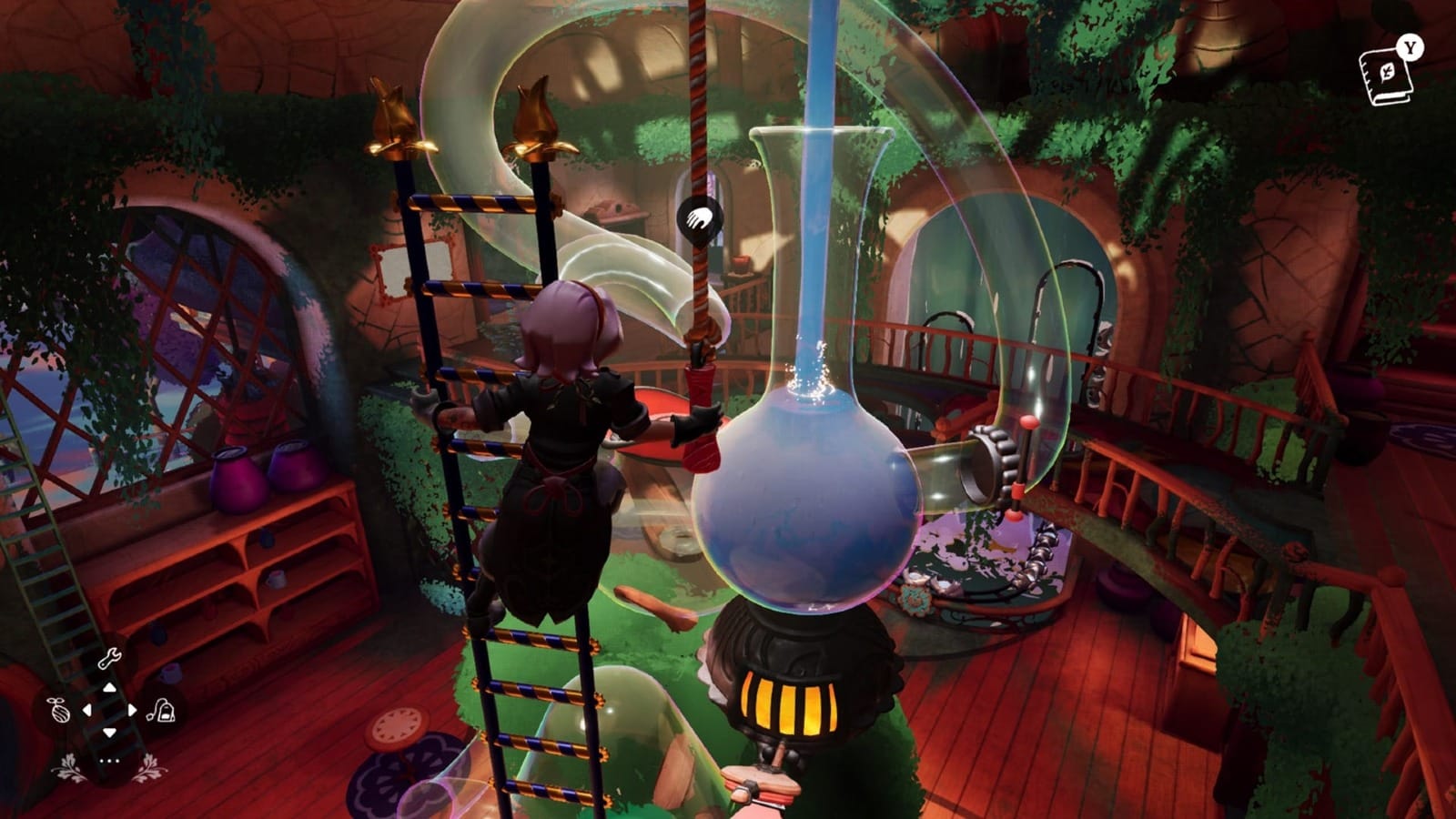
Other tasks are simple: you can use a basket to collect tea leaves from tea bushes, plop them into one of your stations, wait a while, and it will produce a tea ball, which serves as a base for all your tea recipes. You can also clip away weeds and brush up leaf piles, which add to the feeling of slowing down and doing the simple tasks in life. These tasks are accompanied by cute and quirky animations that characterize Alta. You can choose to rapidly press the A button to hack and slash at a leaf pile, or you can hold A and gently sweep it away. These little moments were perfect in capturing what Wanderstop wants you to experiment with, whether to slow down or to ramp it up in order to get results.
Easily the best part about Wanderstop is its colorful cast of characters, all brimming with charm and life, so when I finished my playthrough, I remembered every single one of them. This was probably due to their funky designs, from a dad in a suit of armor with an ugly tie poking out, to a consumerist, capitalist crazy old grandma, to an entourage of businessmen with slightly varying names. Each one has their own unique tea-drinking and walking animations, and all bring their own dilemmas to the table. Alta can try to ease these or use them as a reflection of her own character. I wouldn’t be surprised if there were lots of interpretations that escaped me on a first playthrough. My first idea was that the customers represented aspects of Alta’s life, but I’ll let you know when I’ve thought about it more.
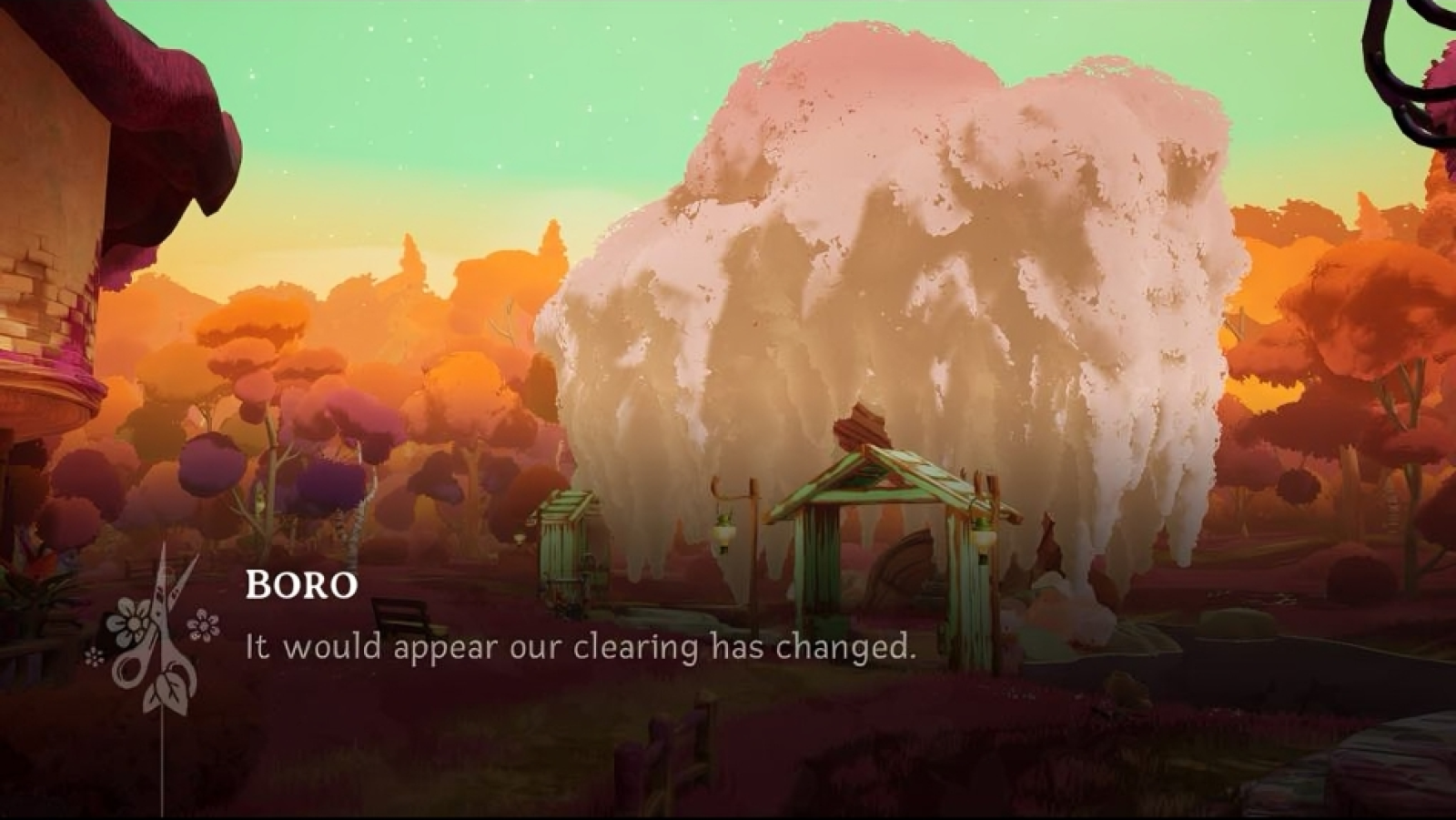
Due to the forest being ever-changing and a representation of Alta’s tumultuous journey, these characters tend to not stick around for very long. They all have their contained story arcs that range from funny to chaotic and even heartbreaking, which were all fun to engage with, but some characters were definitely more important than others, striking hard-hitting story beats that would change the course of the peaceful clearing in the forest.
One of my absolute favorite parts of Wanderstop was its photo mode. You can snatch up a camera left out by Boro and fill the numerous empty frames in the tea shop, but as Boro advises, you haven’t got the ability to make more frames, so you have to make do with the ones you have. When I immediately saw the customer’s designs, I knew I wanted to fill the store with pictures of them, so when they left, Alta had the memory of helping them and bettering herself. It made the latter half of Wanderstop quite an emotional one as I reflected on Alta’s journey. I ensured memories and remembrance were a core part of my tea shop, which lent itself to Wanderstop’s cycle mechanic. The game is separated into chapters that have their own self-contained stories and objectives. Once you reach an emotional high/turning point, Boro asks you to stand by the shrine and simply think. This resets the entire area, making you lose all your crops, items, etc. This soft reset was tough going when you realize you can’t keep every single photo and trinket but eased the pressure of hoarding—a typical procedure in many of my management sim adventures…
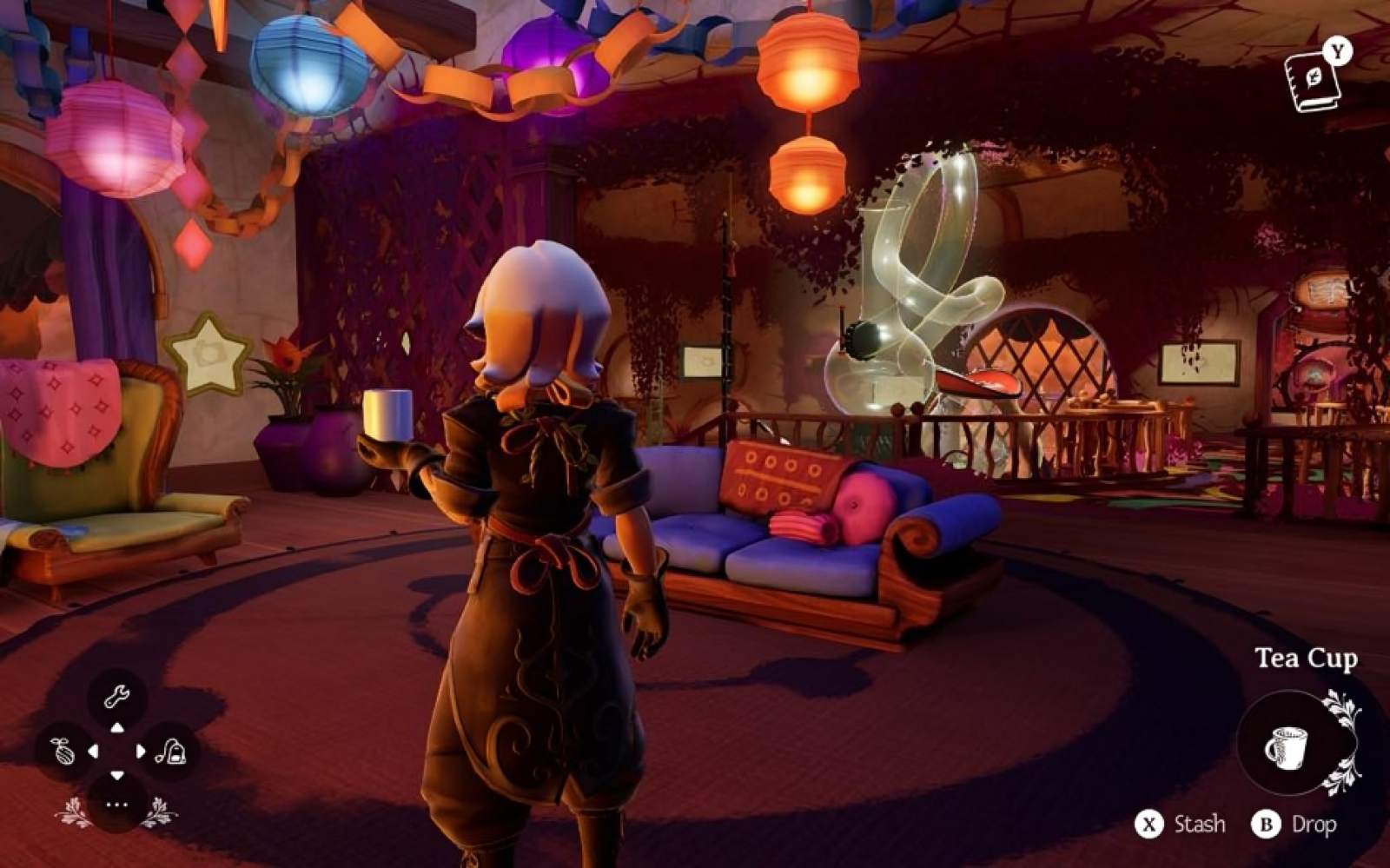
All of this is tied up wonderfully with a beautiful and vibrant art style and powerful voice acting from Kimberley Woods, who plays Alta. And a calm and whimsical score from C418, an absolute master at their craft. The clearing in the forest and the tea shop both become so familiar as you get stuck into their everyday lives, and having Boro as your kind and thoughtful guide makes for a wonderful adventure. Alta herself clashes directly with the peace of Wanderstop, with her abrasive attitude and lack of interest in anything that isn’t’ battles or swords. But her journey is woven into everything the player does. When speaking with characters, you begin the game with snarky dialogue choices, but as you start to actually ‘see’ people, you can opt for more sympathetic and thoughtful dialogue options.
Unfortunately during my time playing Wanderstop, on both PC and steam deck, I encountered a lot of buggy animations and a ton of pop-ins. It wasn't game-breaking, but it was noticeable and can feel a bit clunky. I wouldn't say it will affect your entire experience, Wanderstop is still visually gorgeous and thew amount of [personal animations more than makes up for it, but as a review its worth mentioning.
Wanderstop
Excellent
After all that gushing about what makes Wanderstop great, I’m now kind of lost for words. This game takes the conventions of the much-loved cozy genre and turns it into an emotional experience that touches on some very real issues. Slowing down and doing mundane tasks has never felt so fulfilling, not only for the player but for Alta too, who is a wonderfully flawed main character that brings the story to life. Boro and his funky range of customers are charming and all bring something thoughtful to comment on, whether it be on Wanderstop’s themes or asking for dirt-flavored tea, and after 15 hours, I really didn’t want to say goodbye.
Pros
- Subverts the cozy game genre in inspiring and thoughtful ways
- Beautifully crafted emotional high points and journey
- Style and music that fits the vibe perfectly
Cons
- A few technical errors, pop ins and a broken cutscene that has since been patched
This review is based on a retail PC copy provided by the publisher.
